ANNUAL REPORT 2022

CONTENTS MessagefromtheChancellor 2 MessagefromthePresident 4 2022Highlights 6 GovernanceandLeadership 8 OurStudents 9 OurProgrammes 10 PhD in Maritime Affairs – Malmö, Sweden 10 MSc in Maritime Affairs – Malmö, Sweden 10 MSc Outreach in China 11 MPhil 11 Professional Education 11 Masters Degree 11 Postgraduate Diplomas 11 Executive and Professional Development Courses 11 English & Study Skills Programme (ESSP) – Malmö, Sweden 11 Research 12 WMU-SasakawaGlobalOceanInstitute 14 ExecutiveandProfessionaleducation(EPEx) 16 SummerInstitute 17 InternationalConferences&Events 18 InternationalCollaboration 19 Publications 19 HumanResources 20 ContributionstotheUN2030SustainableDevelopmentAgenda 22 IndustryLiaisonGroup 23 StewardsoftheSeaCampaign 24 FellowshipDonors 25 Donationsin2022 26 FieldStudies 27 Facilities 27 Finances 28 Publications 30
THE MISSION OF THE WORLD MARITIME UNIVERSITY (WMU) IS TO BE THE WORLD CENTRE OF EXCELLENCE IN POSTGRADUATE MARITIME AND OCEANS EDUCATION, PROFESSIONAL TRAINING AND RESEARCH, WHILE BUILDING GLOBAL CAPACITY AND PROMOTING SUSTAINABLE DEVELOPMENT.

WHO WE ARE
As a global centre of excellence established within the framework of the International Maritime Organization (IMO), a specialized agency of the United Nations, the World Maritime University plays a significant role in maritime and ocean education, research, capacity-building and economic development while promoting the role of women in the maritime and ocean sectors.
The aim of WMU is to further enhance the objectives and goals of the IMO, IMO member States and the maritime industry, building global capacity through our unique postgraduate education programmes as well as professional development courses and research that meet the highest standards in maritime and oceans affairs. We work closely with the IMO and key stakeholders including maritime and port administrations, the maritime industry and non-governmental organizations.
The United Nations General Assembly (UNGA) on 30 December 2022 adopted Resolution 77/248 on Oceans and the Law of the Sea. The resolution continues, for the thirteenth consecutive year since 2009, to recognize the importance of the World Maritime University (WMU) of the International Maritime Organization (IMO), as a centre of excellence for maritime education, research and capacity building. The resolution confirms WMU’s “effective capacity-building role in the field of maritime transportation, policy, administration, management, safety, security and environmental protection, as well as its role in the international exchange and transfer of knowledge, notes the role of the World Maritime University-Sasakawa Global Ocean Institute and urges States, intergovernmental organizations and other bodies to make voluntary financial contributions to the University’s Endowment Fund.” The University’s connection to the United Nations family, and unique relationship with IMO, are invaluable assets that are only offered by WMU.
The impact of WMU has been immense since its inauguration in 1983. With an international presence and a global reach, there are 5,807 graduates from 170 countries and territories. WMU continues to build maritime and ocean capacity and expertise taking into account the UN Sustainable Development Goals (UN SDGs) 2030.
THE VISION OF WMU IS TO INSPIRE LEADERSHIP AND INNOVATION FOR A SUSTAINABLE MARITIME AND OCEANS FUTURE.
MESSAGE FROM THE CHANCELLOR
THE TOTAL NUMBER OF WMU GRADUATES NOW STANDS AT 5,807 FROM 170 COUNTRIES AND TERRITORIES. THESE GRADUATES HAVE NOW JOINED THE EXCEPTIONAL INTERNATIONAL ALUMNI NETWORK, OF WHICH I AM A PROUD MEMBER, AND I LOOK FORWARD TO THEIR CONTRIBUTION TO THE MARITIME SECTOR AND ACHIEVEMENTS AS MARITIME AND OCEAN LEADERS. THEIR INTERDISCIPLINARY STUDIES WITHIN THE EXCEPTIONAL INSTITUTION THAT IS WMU, HAS PREPARED THEM WITH THE KNOWLEDGE OF IMO’S MISSION TO PROMOTE SAFE, SECURE, ENVIRONMENTALLY SOUND, EFFICIENT AND SUSTAINABLE SHIPPING THROUGH COOPERATION.
AstheChancelloroftheWorldMaritime University(WMU),itisanhonourfor metopresentthe2022AnnualReport onbehalfoftheUniversity’sBoardof GovernorsandtheExecutiveBoard.I wishtothankthemembersoftheBoards fortheirdedicationandhardwork.
I commend the University on successfully emerging from the challenges posed by the COVID-19 pandemic. It is of great credit to President Doumbia-Henry, the faculty and staff of WMU that the University continued to deliver on its mandate throughout the pandemic, providing uninterrupted education to its students. Credit also goes to the students who successfully completed their studies during the pandemic as the circumstances required them to overcome unique challenges.
After three years, it was a great pleasure to be able to gather, once again in person, for a momentous graduation ceremony in November for the Class of 2022.
The Class of 2022 included 276 graduates – 132 MSc graduates from the Malmö Headquarters and 63 MSc graduates from the China programmes (a combined total of 194 MSc graduates), two MPhil graduates, four PhD graduates and 75 graduates from
the distance learning programmes (including 8 LLM graduates). 34 percent of the overall graduates in 2022 were women. The total number of WMU graduates now stands at 5,807 from 170 countries and territories. These graduates have now joined the exceptional international alumni network, of which I am a proud member, and I look forward to their contribution to the maritime sector and achievements as maritime and ocean leaders. Their interdisciplinary studies within the exceptional institution that is WMU, has prepared them with the knowledge of IMO’s mission to promote safe, secure, environmentally sound, efficient and sustainable shipping through cooperation.
On 30 December 2022, the United Nations General Assembly (UNGA) continued for the thirteenth consecutive year to recognize the importance of WMU as a centre of excellence for maritime education, research and capacity building and calls on intergovernmental organizations and other bodies to make voluntary financial contributions to the University’s Endowment Fund. The continued commitment of our donors throughout the pandemic demonstrated their understanding of WMU’s impact in education, research and capacitybuilding. In turn, these investments in the

2 2022AnnualReport / WorldMaritimeUniversity
Mr.KitackLim WMU Chancellor and Secretary-General, International Maritime Organization, WMU Class of 1991
future of the maritime industry support the effective implementation of IMO instruments and policies, as well as that of the UN SDGs, for the benefit of humankind.
I wish to express my heartfelt appreciation to all organizations and institutions that support WMU in achieving its global mission, especially the Government of Sweden and the host City of Malmö without the support of which, the success of WMU would not be possible. Sincere thanks are also extended to the University’s many donors for their ongoing support to the University, particularly those who provided fellowships for the Class of 2022, as well as the many Governments that sponsored their employees. The support of our donors is essential to fulfilling our capacity building mission as we educate the maritime and ocean leaders of today and tomorrow.

The WMU team has also tirelessly sought to secure the financial sustainability of the University through the Stewards of the Sea campaign to help ensure the long-term future and success of WMU, which will benefit future students.
My heartfelt gratitude goes to Dr. Cleopatra Doumbia-Henry, President of WMU, for her eight years of dedication and passion that has advanced the University both financially and academically. My appreciation also goes to the Board, the Faculty and Staff that have ensured that WMU continues to be at the forefront of maritime and ocean education, research and capacity-building.
MESSAGE FROM THE PRESIDENT
WMU HAS GROWN INTO A PLACE THAT INFLUENCES THE WHOLE WORLD THROUGH OUR MAGNIFICENT GRADUATES WHO HAVE BEEN EDUCATED IN THE TRUE SPIRIT OF THE UNITED NATIONS. OUR ALUMNI ARE COGS IN THE MACHINERY THAT MAKES MODERN LIFE POSSIBLE. TOGETHER, WE CAN WORK TOWARDS THE CREATION OF A SAFE, SECURE, SUSTAINABLE AND EFFICIENT MARITIME AND OCEANS FUTURE – FOR THE BENEFIT OF ALL OF US, AND THE FUTURE GENERATIONS TO COME.
Theyear2022broughtanendtothe COVID-19pandemicthathadimpacted livesaroundtheworld.Forthefirsttime inovertwoyears,webegantoreturn to“normal”astheworsteffectsofthe pandemicreceded.Iwishtoexpress mygratitudetotheWMUcommunity asawholefortheinvaluablesupport thatwasinstrumentalinensuring thatWMUunwaveringlydeliveredthe higheststandardsofeducationand continuedtoadvanceimportantmaritime andoceanresearchthroughoutthese unprecedentedcircumstances.
I am particularly proud of how our dedicated team of faculty and staff navigated these troubled waters together, and unfailingly delivered on our mission of providing excellence in postgraduate maritime and oceans education, professional training and research, while building global capacity and promoting sustainable development. Strength, resilience and calm, continued to be the hallmarks of our students, faculty and staff as they rose above the pandemic circumstances yet again in 2022. In November, after a 3 year hiatus, we were able to once again gather together to celebrate the graduation of a new cadre of maritime and ocean leaders, duly educated by WMU. These emerging leaders are charged with the task of taking the knowledge they have acquired to help the maritime and ocean industries recover from the pandemic, as well as to play an active role in preparing the industry to meet any such challenge again should it be required to do so.
The stalwart Class of 2022 joined WMU during the COVID-19 pandemic, and the MSc in Maritime Affairs programme in Dalian achieved record enrolment with a total of 52 students. I have no doubt that the challenges faced by the Class of 2022 will contribute to their strength of character and determination. I am pleased to report that 34 percent of the graduates in 2022 were women, and the overall number of WMU graduates now stands at 5,807 from 170 countries and territories. We are immensely proud of our global network of alumni who are maritime and ocean leaders enabling positive change in the industry at national, regional and global levels. Among the highlights of 2022 was achieving accreditation by the Government of Sweden of the Malmö MSc in Maritime Affairs and the PhD programme. The entire WMU community is delighted by the successful outcome of the accreditation process which has been ongoing for some years. We are immensely grateful for the support and assistance of the Government of our host country, Sweden.
In 2022, there were 33 research projects and consultancies underway at WMU. Highlights include the launch of two EU funded Horizon Europe research projects – Sustainability EducationAl programme for greeNER fuels and enerGY on ports (SEANERGY), and Ocean Improving Carbon Understanding (Ocean ICU). Two COVID-19 related projects focused on the pandemic effects including dealing with anxiety during a pandemic to enhance adult well-being, as well as the effects of the
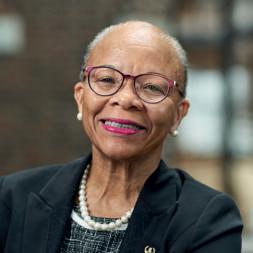
4 2022AnnualReport / WorldMaritimeUniversity
Dr.CleopatraDoumbia-Henry President
pandemic on seafarers and shipping. In 2022, the CAPFISH project continued to deliver workshops and publications focused on capacity-building to progress the implementation of international instruments to combat Illegal, Unreported and Unregulated (IUU) fishing. Work also continued in 2022 on consultancy and research projects for the European Maritime Safety Agency (EMSA) with a new project focused on the potential impact of COVID-19 on shipping safety, including seafarers’ wellbeing and ship operations.
In 2022, the WMU-Sasakawa Global Ocean Institute (GOI) continued to advance the University’s commitment to Goal 14, focused on life below water. Highlights include contributions to the Intergovernmental Conference on an international legally binding instrument on the conservation and sustainable use of marine biological diversity of areas beyond national jurisdiction (BBNJ) at UNHQ, as well as the UNEA Intergovernmental Negotiation Committee aimed at developing a legally binding instrument on plastic pollution, including in the marine environment. The GOI also hosted several events in 2022 including a Regional Conference in Dominica on Identifying Regional Challenges and Opportunities to Address the Issue of Marine Debris, Sargassum and Marine Spatial Planning, and co-organizing with the City of Malmö the One Ocean One Planet: Ocean Literacy Action 2022 Conference. At the 2022 UN Ocean Conference in Lisbon, the GOI team co-hosted three side-events highlighting the Empowering Women for the United Nations Decade of Ocean Science for Sustainable Development Programme, as well as launching the associated Global Stakeholder Consultative Forum. The GOI also led WMU’s role in co-hosting with IMO the International Academic Conference titled “Protecting the Ocean – Moving forward at 50: London Convention & Stockholm Declaration”.
In addition to the events mentioned above, WMU hosted an international seminar on the role of green technologies and capacity building in maritime decarbonization, and hosted the hybrid workshop “Are EU ports ready for alternative fuels?” co-organized by the ENGIMMONIA and SEANERGY projects. The University also hosted the Local Governments for Sustainability (ICLEI) Research Symposium that was part of the ICLEI World Congress 2022, and served as a hub for the A Sustainable Tomorrow 2022 Conference – Sweden’s largest digital conference focused on the environment & the future.
New offerings in 2022 included a Summer Institute on Maritime Decarbonization, and an Executive and Professional Education
(EPEx) programme focused on Maritime Administration. The Summer Institute’s week-long Maritime Decarbonization programme welcomed 35 maritime professionals from 20 different countries to discuss the opportunities and challenges surrounding the reduction of GHG emissions from shipping. The two-week EPEx programme provided an academic offering to 17 professionals from 10 countries focused on specialized knowledge and insight for optimal success in Maritime Affairs. These short-course options for professionals provide a valuable lifelong learning option and we were pleased to welcome many WMU alumni back to the University for these offerings.
I wish to extend sincere thanks to the Government of Sweden and the City of Malmö, the hosts of WMU, for their continued generosity, including the financial support for the operations of the University and facilities to support the expanding WMU community of faculty, staff, researchers, PhD students and visiting lecturers. As I have reiterated many times, it is imperative that the long-term financial sustainability of WMU is secured. We thank the many donors, contributors, supporters, and the broader WMU community for their continued support. WMU’s mandate and mission are essential to the global maritime and oceans sector through providing advanced education, research, and capacity building. WMU’s position in the industry is unparalleled, and we must increase our unwavering efforts to advance the Stewards of the Sea campaign in support of the WMU Endowment Fund to ensure that this postgraduate academic institution for the world can continue to educate maritime and ocean leaders who will support a sustainable future for the generations to come.
The year 2022 marks my final full year as President of WMU. It has been an exceptional privilege to lead this esteemed institution. A hallmark of WMU over its near four decades of service to the maritime community is that it offers a matchless forum for bringing together maritime professionals from around the world, to exchange ideas, and to offer inspiration and understanding on common issues through the prism of a new approach. WMU has grown into a place that influences the whole world through our magnificent graduates who have been educated in the true spirit of the United Nations. Our alumni are cogs in the machinery that makes modern life possible. Together, we can work towards the creation of a safe, secure, sustainable and efficient maritime and oceans future – for the benefit of all of us, and the future generations to come.
5
2022 HIGHLIGHTS
January
WMU is Authorized to Issue Degrees by the Government of Sweden
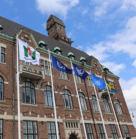
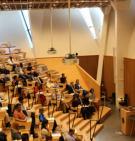

On 13 January 2022, the Government of Sweden issued a press release confirming that WMU’s degrees are now accredited by the Swedish authorities.
March
NSB Supports Research for WMU Masters Students
A student competition identified outstanding students to be offered close cooperation with, and an internship at the German shipping company, Niederelbe Schiffahrtsgesellschaft mbH & Co. KG (NSB), in writing their dissertation.
April
Domestic Passenger Ships Safety

WMU partnered to enhance the safety and energy efficiency of domestic ferry operations in the Philippines as part of a year-long project funded by the World Bank Group (WBG), the International Finance Corporation (IFC) and the IMO Integrated Technical Cooperation Programme.
Closing-the-Circle Conference in Eastern Caribbean
From 4–7 April, WMU hosted a high level Conference in Dominica on the topic of Identifying Regional Challenges and Opportunities to Address the Issue of Marine Debris, Sargassum and Marine Spatial Planning.

March
IMO E-Learning Portfolio
On 7 April, the IMO launched the first open access course in their e-learning portfolio with "An Introduction to Oil Pollution Preparedness, Response and Cooperation" that was developed in collaboration with WMU.
May
Workshop on Ammonia and Hydrogen as Maritime Fuels Maritime experts gathered at WMU 20–21 April to discuss ammonia and hydrogen as alternative maritime fuels as part of the Nordic Maritime Transport and Energy Research Programme (NER).
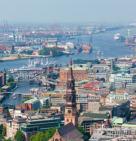
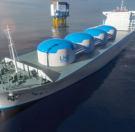
June
ICLEI Research Symposium
On 10 May, WMU hosted the Local Governments for Sustainability (ICLEI) Research Symposium that was part of the ICLEI World Congress 2022. Several WMU faculty, researchers and staff contributed to the overall programme as speakers, moderators and rapporteurs.

August
Inaugural WMU Summer Institute
On 22 August, the inaugural WMU Summer Institute launched with a week-long intensive programme on Maritime Decarbonization. Maritime professionals spent the week learning about opportunities and challenges surrounding the reduction of GHG emissions from shipping.
WMU/ITF Transport 2040 Phase II
Two workshops were delivered online in March for Phase II of the WMU/ITF Transport 2040 project. The Building the Road Map to Future Shipping Technologies stakeholder workshops addressed vital issues relating to the Future of Work in the maritime, oceans, ports, and related industries.
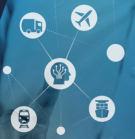
Record Enrolment in Dalian

The MSc in Maritime Affairs specialization in Maritime Safety and Environmental Management, offered in partnership with Dalian Maritime University, set a new enrolment record for the programme with a total of 52 students, all from China.
UN Ocean Conference
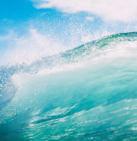
For UNOC 2022, WMU delivered three joint side events on the themes of: Empowering Women: An Ocean of Opportunities in Science, Policy and Blue Economy; Empowering Women for the UN Decade of Ocean Science; & Educating Ocean & Maritime Leaders.
Maritime Decarbonization Seminar
From 30–31 August, WMU hosted an international seminar on the role of green technologies and capacity building in maritime decarbonization, including ways of promoting global collaboration and capacity-building in maritime decarbonization.
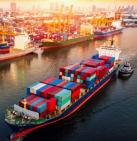
6 2022AnnualReport / WorldMaritimeUniversity
August
China Graduation Ceremonies
Graduation ceremonies were held on 25 and 26 August for the MSc programmes in Shanghai and Dalian respectively with a total of 63 students. A total of 1,165 students have graduated from China programmes since they were founded in 2005.
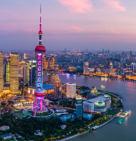
September
A Sustainable Tomorrow Hub
On 15 September, WMU was a hub for the A Sustainable Tomorrow 2022 Conference – Sweden’s largest digital conference focused on the environment and the future.
October
Inaugural EPEx Programme
From 5 to 16 September, WMU held the inaugural Education for Professional Excellence (EPEx) programme focused on Maritime Administration with a view to equip maritime professionals with specialized knowledge and insight for optimal success in Maritime Affairs.
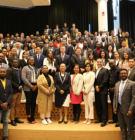
Seminar for Port Security Officers
On 28–29 September, the WMU-GOI hosted the annual Seminar for Port Security Officers (PSO), co-organized with Nordic Crisis Management and delivered to Harbour Masters from Scandinavia.
Friends of WMU Germany Seminar
The second annual Friends of WMU Germany seminar took place on 5 October with the topic "Shipping in a Changing World – How Can We Collaborate in the Future?"
November
Malmö Graduation Ceremony
On 31 October, the Class of 2022 graduation ceremony was held in Malmö, bringing the total number of graduates to 5,807 from 170 countries and territories.
December
Lloyd’s List Top 100
In December it was announced that President Doumbia-Henry was selected once again for the Lloyd’s List Top 100 annual ranking of the most influential people in shipping.

Class of 2023 Inauguration, Malmö
Inauguration of the Class of 2023 in the Malmö MSc in Maritime Affairs, took place on 19 September. The Class included 126 students from 54 countries.

Latin American Alumni Association Established

On 7 October, the Latin American Alumni Association (LATAMA) was launched with a regional, rather than national approach, to support effective implementation of IMO instruments.
IMO-WMU Conference on Protecting the Ocean

From 10–13 October, WMU hosted the IMO-WMU Joint International Academic Conference entitled Protecting the Ocean –Moving forward at 50: London Convention & Stockholm Declaration.
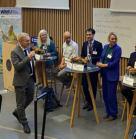
Alternative Fuels and EU Ports Workshop

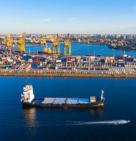
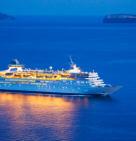
On 10 November, WMU hosted the hybrid workshop “Are EU ports ready for alternative fuels?” co-organized by the ENGIMMONIA and SEANERGY projects, both co-funded by the EU.
UN General Assembly Continues to Recognize Important Role of WMU

On 31 December, the UNGA continued for the 13th consecutive year, to recognize the importance of WMU as a centre of excellence for maritime education, research and capacity building.

7
GOVERNANCE AND LEADERSHIP
THE WMU REVISED CHARTER, ADOPTED BY THE 30TH SESSION OF THE IMO ASSEMBLY IN DECEMBER 2017, SETS THE COURSE FOR THE NEXT DECADE.
In accordance with the Charter, WMU’s governance structure consists of a Board of Governors (BoG) and an Executive Board (EB). The IMO Secretary-General is the WMU ex-officio Chancellor. The President directs and administers the University.
The BoG meets once a year and is responsible for exercising due governance of the University, ensuring the effectiveness and continuity of its operations, protecting the autonomous nature of the University within the framework of the IMO, and ensuring the maintenance of the highest academic and professional standards. The BoG is composed of up to 30 members who are appointed by the IMO SecretaryGeneral for a renewable period of three years. The BoG meets annually and is chaired by the Chancellor. The reports approved by the BoG are submitted to the IMO Council. The Chairperson of the Executive Board, the President of the University as well as the ex-officio member from the Government of Sweden attend meetings of the BoG.
The EB is composed of up to 11 members, 8 of whom are appointed by the BoG, while the IMO Secretary-General appoints the Chairperson of the EB. They have a renewable two-year term of office. The EB meets three times a year. In addition to performing functions specified in the Charter, it facilitates the work of the University, provides oversight between sessions of the BoG, monitors the implementation of the decisions of the BoG and gives directions and guidance as necessary.
The President is appointed by the SecretaryGeneral of the IMO to direct and administer the University, in accordance with the University’s Statutes, Regulations and Rules, strategic directions and plans. The President presides over the Academic Council, which assists in the coordination, promotion and implementation of the academic work programme of the University. The President is assisted by the Vice President International, the Vice President Academic, Director of the WMU – Sasakawa Global Ocean Institute and the Chief Operations Officer.
WMU IS GOVERNED BY A CHARTER ADOPTED BY THE IMO ASSEMBLY, WHICH IS MADE UP OF DELEGATIONS FROM 175 IMO MEMBER STATES AND 3 ASSOCIATE MEMBERS.
OUR STUDENTS
WITH 5,807 ALUMNI FROM 170 COUNTRIES & TERRITORIES, WMU HAS A REMARKABLE PRESENCE IN THE MARITIME SECTOR.
The total number of female graduates to date is 1,295 including 752 female graduates of the Malmö MSc programme.
159 2 21 75 19 EnrolledStudents 2021 2022 Malmö 131 126 PhD (continuing) 46 44 Dalian 41 52 Shanghai 23 32 MPhil 21 Marine Insurance 58 Maritime Energy 12 10 Executive Maritime Management 37 28 International Maritime Law 42 41 LLM 8 11 ESSP (no ESSP only) 26 (no ESSP only) 24 Total 347 353
WMUalumniassumepositionsof prominencearoundtheworldsuch asPrimeMinister,Ministersand seniormaritimeofficials,Directors ofshippingcompaniesandports, andasheadsofmaritimeacademies andnavalorganizations.Theyhold prominentpositionswithinUN organizationsincludingthecurrent Secretary-GeneraloftheIMO,and manyrepresenttheirhomecountries attheIMOandininternational forumsandorganizations.Thealumni maintainclosetieswitheachother creatingauniquemaritimeglobal networkthatincreasesby~350 graduatesannually.
2022 WMU GRADUATES 276 9
OUR PROGRAMMES
PhDinMaritimeAffairs–Malmö,Sweden
Designed as a flexible research degree related to the IMO mission of safety, security and environmental protection, the PhD programme involves 3–6 years of study on a full or part-time basis at WMU or elsewhere. PhD students are either self-funded or supported by research projects. The PhD programme provides the University with both an income stream from tuition fees and significantly increases its publication and citation listings.
Doctoral research at WMU falls mainly within one of the following Research Priority Areas (RPAs):
• Environmental Impacts of Marine Activities
• Maritime and Marine Technology and Innovation
• Maritime Economics and Business
• Maritime Energy Management
• Maritime Law, Policy and Governance
• Maritime Safety
• Maritime Social and Labour Governance
In addition to the above RPAs, the WMU–Sasakawa Global Ocean Institute carries out and coordinates research in line with its vision to act as an independent focal point for the ocean science–policy–law–industry–society interface where policy makers, the scientific community, regulators, industry actors, academics, and representatives of civil society meet to discuss how best to manage and use ocean spaces and their resources in accordance with the UN SDGs. Through evidence–based research, the Institute seeks to provide new perspectives on how to address the manifold threats facing the ocean.
MScinMaritimeAffairs–Malmö,Sweden
In 2022, student enrolment was 131 on the flagship Malmö-based MSc programme. This enrolment number, despite the pandemic, speaks to the strength and influence of the University. The proportion of MSc students in Malmö who are funded by their employer, government, or from personal resources is an indicator of the University’s financial health. In 2022, six students (5%) were self-funded.
The Malmö MSc programme is designed for mid-career maritime professionals to meet the current needs of the maritime sector. The first term of the standard 14–month programme includes research methodology and lays the foundation for successful graduate studies.
The accelerated 10–month programme begins in the second specialization term that integrates academic subjects with real–world applications through the field study programme and visiting lecturers from the maritime and ocean sector. In the final term, students deepen their knowledge in their main field of study while simultaneously broadening their knowledge base through exploration of the other subject areas. The Class of 2019 was the first class for which a written dissertation was a requirement for all.
The MSc programme in Malmö offers seven specializations:
• Maritime Safety & Environmental Administration
• Maritime Law & Policy
• Maritime Education & Training
• Port Management
• Shipping Management & Logistics
• Maritime Energy Management
• Ocean Sustainability, Governance & Management
In 2022 there were 60 Visiting Lecturers from around the world that contributed to the programmes at WMU. These visiting maritime professionals provide unique and invaluable insight into the maritime industry and are a guarantor for practice-informed research and teaching at the University.
10 2022AnnualReport / WorldMaritimeUniversity 2022GraduatesbyProgramme PhD 4 Malmö 132 Dalian 41 Shanghai 22 MPhil 2 PgDip Marine Insurance 2 PgDip Maritime Energy 10 PgDip Executive Maritime Management 30 PgDip International Maritime Law 25 LLM International Maritime Law8 Total 276
2022MalmöMSc–Enrolmentsbytypeoffunding Donor funded students 100 Government/company funded students 20 Self-funded students 6
MScOutreachinChina
Established in 2005, the outreach MSc in Maritime Affairs programmes in China were designed to extend WMU’s professional education to a new and thriving clientele from the region and beyond, and to meet the maritime industry’s demand for high–level specialized professionals in China’s maritime market. The International Transport & Logistics (ITL) specialization is delivered in Shanghai in cooperation with Shanghai Maritime University. The Maritime Safety & Environmental Management (MSEM) specialization is delivered in Dalian in cooperation with Dalian Maritime University. The 14–month intensive programmes are taught entirely in English and the entry requirements, grading system and quality assurance process are those in force at WMU.
In 2022, enrolment in the two programmes increased significantly with 84 students in total compared to 64 in 2021. In the Shanghai programme enrolment increased from 23 in 2021 to 32 in 2022. The Dalian programme enrolment increased from 41 students in 2021 to 52 in 2022. It is of note that the MSEM Class of 2022 set a new record for gender parity in the MSEM programme with 21 female students representing 50 per cent of the enrolment. A WMU gender parity record of 50/50 was first set in 2019 in the Shanghai programme.
MPhil
In 2017, WMU and the International Maritime Law Institute (IMLI), sister institutions founded by the IMO, welcomed the first student in the Master of Philosophy (MPhil) programme in International Maritime Law and Ocean Policy. The unique, two–year programme offers students the chance to spend their first academic year in Malmö, following WMU’s specialization in Ocean Sustainability, Governance and Management (OSGM), and the second academic year in Malta, following IMLI’s LLM programme. The MPhil has been designed to provide a unique learning opportunity for maritime professionals who aim to shape the future of the world’s oceans in accordance with Goal 14 of the UN 2030 Agenda for Sustainable Development. Graduates of the programme are expected to play an important role in developing national ocean governance policies to reflect the latest international initiatives, rules and regulations. Two students graduated from the programme in 2022 and there was one new enrolment.
ProfessionalEducation
WMU collaborates with internationally renowned partners to deliver a variety of distance learning programmes including an LLM and four Postgraduate Diplomas. Three of the programmes are offered in partnership with either Lloyd’s Maritime
Academy or DNV Maritime Academy. These programmes address current topics of critical importance in the maritime industry with a blended-learning approach. The distance learning programmes offered in 2022 by WMU and our partners included:
MastersDegree
LLM in International Maritime Law*
PostgraduateDiplomas
Maritime Energy
Marine Insurance Law and Practice
International Maritime Law*
Executive Maritime Management**
*in partnership with Lloyd’s Maritime Academy
**in partnership with DNV’s Maritime Academy
ExecutiveandProfessional DevelopmentCourses
WMU delivers Executive and Professional Development Courses (EPDCs) around the world, providing an opportunity for mid–career updating and knowledge–sharing for maritime professionals. EPDCs range in length from a few days to several weeks and the blend of academic expertise and hands–on practical experience can be immediately applied in the workplace. Topics addressed meet current and future needs of the maritime market, particularly in key IMO-mandated areas. EPDCs can be customized to meet the educational requirements of a particular organization.
WMU’s EPDC activities continued in 2022 as the pandemic was declared officially over. Two EPDCs were conducted for one client, GEFO, with a total of 48 participants over 3 training days and 18 training hours. Topics covered included Seafarer Health and Wellbeing. In addition, WMU collaborated with the IMO on the delivery of two workshops on the Introduction to the National Maritime Transport Policy (NMTP) with a total of 56 participants over 6 days and 36 training hours. The first delivery took place in Suriname in cooperation with the Maritime Authority of Suriname, the Suriname National Maritime Association (SNMA), under the aegis of the Ministry of Transport, Communications and Tourism, and the second for the Navy in Brazil.
English&StudySkillsProgramme (ESSP)–Malmö,Sweden
Open to students joining WMU’s standard MSc programme, or to independent students, the 3–month English & Study Skills Programme (ESSP) curriculum is designed to upgrade the English language competencies of the participants to postgraduate level. The programme begins in June annually. In 2022, all students enroled in ESSP continued on to the Malmö MSc programme.
11
RESEARCH
The WMU Maritime Research Agenda and the Global Ocean Research Agenda are integral components of the WMU Strategic Plan 2020–2023. WMU undertakes research work for the IMO and other UN agencies, the EU and for maritime and ocean organizations and the industry worldwide. WMU has twelve Research Priority Areas.
MaritimeResearchPriorityAreas
• Environmental Impact of Maritime Activities
• Maritime Safety
• Maritime Energy Management
• Maritime Social and Labour Governance
• Maritime and Marine Technology and Innovation
• Maritime Economics and Business
• Maritime Law, Policy & Governance
OceanResearchPriorityAreas
• Navigational Right & Freedoms
• Deep Blue: Capacity Building & Areas Beyond National Jurisdiction
• Oceans, Climate Action & the UN 2030 Agenda
• Blue Limits: Spatial Governance of Ocean Space & the Ocean/Coastal/ Terrestrial Interface
• Challenges in Ocean Governance
In 2022, WMU continued to successfully attract funding from a number of sources for research projects and consultancies. These projects generate significant gross income for WMU and enable the recruitment of research associates and research assistants whose employment costs are met from research contracts. As a result of the research efforts, the University contributes valuable knowledge to the maritime community, and also benefits from an enhanced publication record, reputation and global impact. In 2022, there were 33 ongoing WMU research projects and consultancies that generated revenue worth USD 2.1 million. Highlights of maritime and ocean research in 2022 include the following:
SEANERGYProjectInitiated
Work began on 7 October 2022 with a 14 partner consortium on the EU funded Horizon Europe research project, SEANERGY
– Sustainability EducationAl programme for greeNER fuels and enerGY on ports.
SEANERGY aims at supporting the creation of the best possible setting and conditions
for the EU energy transition through the development and implementation of sustainability and educational paths centred on the port ecosystem. WMU will cooperate to achieve the project goal of developing a Master Plan to help achieve zero-emission ports by 2050 and provide solutions to port energy transition challenges. The master plan will be an aggregator of information and is intended to develop guidelines that will allow all the port-industry’s stakeholders, regardless of their geographical context, to assess, plan and execute the necessary activities towards transforming ports into clean energy hubs. WMU will lead the work on “Understanding the current EU ports’ situation and stakeholders,” that involves identification and analysis of the needs, barriers and know-how of stakeholders involved in the port energy transition. Additionally, WMU will contribute to the other three main stages of the project by supporting activities which will include a survey, an analysis, educational programmes and workshops.
OCEANICUProjectInitiated
Initiated in November 2022 with Horizon Europe funding, the Ocean Improving Carbon Understanding (Ocean ICU) research project aims at understanding past, present and future functioning of the ocean Carbon Cycle with focus on the role of ocean biology to allow managers to preserve and optimize the oceans’ ability to sequester carbon. This objective flows from the critical role the ocean Carbon cycle plays in regulating global climate, taking up approximately 25% of the CO2 emitted to the atmosphere and storing massive quantities of carbon in the interior, much of it via a series of processes known as the Biological Carbon Pump (BCP). Ocean ICU has six measurable and verifiable Scientific and Technical and Outreach objectives related to reducing the uncertainty of past current and future estimates of the ocean C cycle, to produce mathematical representations of key processes, incorporate new knowledge from ST2 into OCEAN ICU modelling tools, to use observational data to create expert knowledge and model scenario simulations, to co-design and employ the ocean decision support tools, and to communicate the outputs in support of science-based management of human activities to protect and increase the role of the ocean in Carbon sequestration. The consortium includes 30 partners and is led by NORCE Norwegian Research Centre AS.
12 2022AnnualReport / WorldMaritimeUniversity
Dealingwithanxietyduringapandemic toenhanceadultwell-being
The COVID-19 pandemic adversely affected workplaces and individuals’ work-life balance, resulting in potentially impaired psychological well-being of employees. The main aim of this project, sponsored by Nordplus, is to contribute to diminishing the impact of the COVID-19 pandemic on workplaces by the development and implementation of training for leaders and employees of organizations, including the maritime sector. The expected results of the project include: 1) to develop and pilot a unique, systematic, and well thought out training programme that is easily adaptable to support leaders in successfully reducing pandemic related anxiety and successively enhance the well-being of their employees through a positive psychoemotional and psychosocial workplace environment; 2) to promote the practical inclusion of the training programme in adult education agendas; 3) to prepare trainers to implement the training programme; and 4) to provide practical training for managers of companies and institutions.
ACapacity-buildingprojectto progresstheimplementation ofinternationalinstrumentsto combatIUUfishing(CAPFISH)
Illegal, Unreported and Unregulated (IUU) fishing is a complex international governance and sustainability problem that is multifaceted and needs to be tackled from many specialist angles. To solve the problem in the real world requires coordination and a holistic understanding of the problem and dissemination of this knowledge, particularly to developing country actors who need it most and have the power to affect change in their communities and institutions. The CAPFISH project, sponsored by the Ministry of Oceans and Fisheries (MOF) of the Republic of Korea, draws upon global expertise in fisheries such as UN agencies, non-governmental organizations, and experts across the world. CAPFISH started in mid 2021 and successfully continued in 2022 with workshops and publications that create a unique opportunity for transformative education to help solve the problem of IUU fishing.
EffectsoftheCOVID-19pandemicon seafarersandshipping
Sponsored by the Swedish Government, this project explores in-depth the effects of the COVID-19 pandemic on seafarers and shipping in response to the challenges that the pandemic posed to seafarers and their families as well as its detrimental impact on the future of shipping. The overall questions relate to the following: the impacts of the pandemic on seafarers, what the actions implemented by maritime stakeholders look
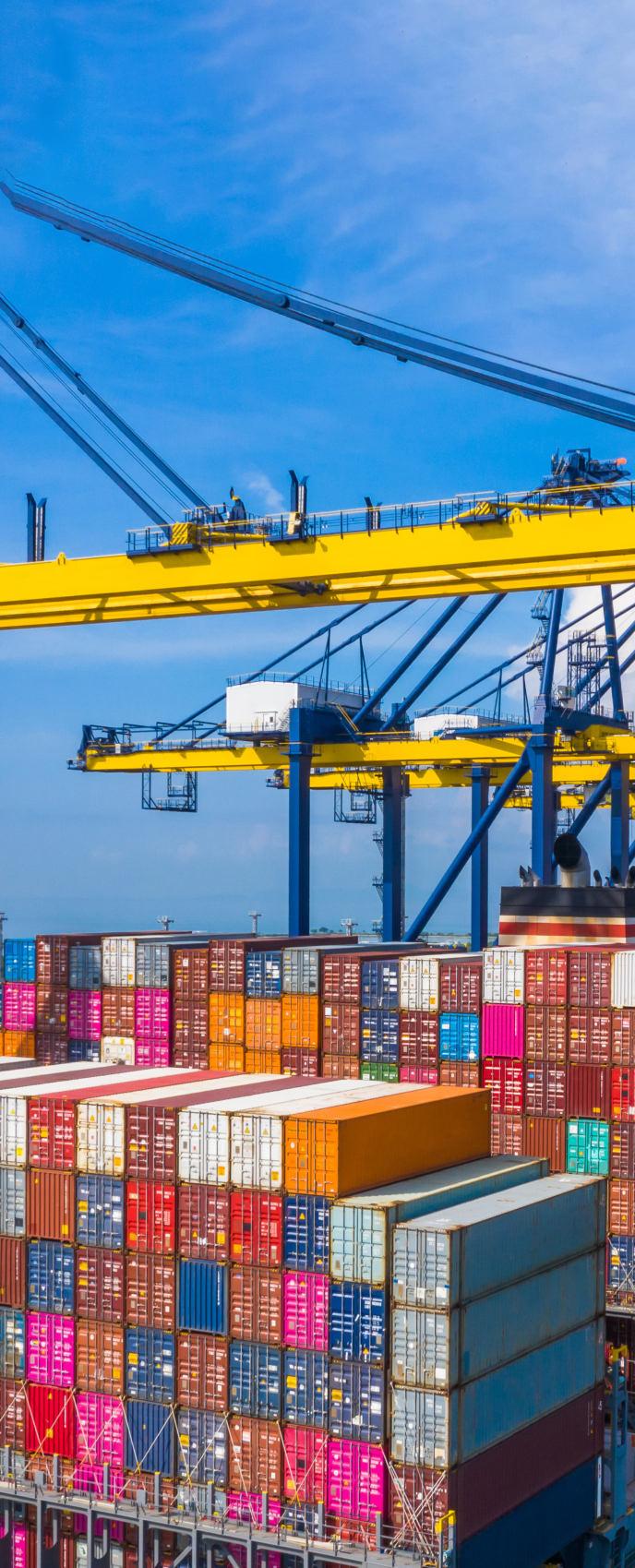
WMU-SASAKAWA GLOBAL OCEAN INSTITUTE
ImplementingtheOceanAgenda
The WMU-Sasakawa Global Ocean Institute (GOI), inaugurated in 2018, continues to implement the WMU Ocean Research Agenda and Priorities Programme 2019–2023 with the generous support of The Nippon Foundation, together with the Governments of Sweden, Canada, and Germany, as well as the City of Malmö. The GOI undertakes challenge-led and evidence-based research, as well as educational and capacity-building training, with a particular focus on the implementation of Goal 14 (Life Below Water), as well as multiple interconnecting goals including Goal 5 (Gender Equality) and Goal 13 (Climate Action) under the UN 2030 Agenda for Sustainable Development.
In2022,theGOIprogressedexceptionally wellandkeyhighlightsinclude:
RealizingNetworks
The GOI continues to foster transformative partnerships by engaging at a high level. During 2022, the GOI team strengthened strategic engagements with key partners and stakeholders. Collaboration also included multiple UN agencies and partners, international and regional organizations, academic institutions, non-governmental organizations, and civil society. The GOI hosted or co-hosted more than 15 events including international conferences, webinars and programme events, held a number of capacity building workshops and activities locally, and contributed to more than 50 international events within the oceans realm. In Sweden, these included Sweden’s Ocean Ambassador and Ministry of Foreign Affairs and Development Agency, the Swedish Agency for Marine and Water Management (SwAM) and the City of Malmö including local schools for youth engagement and capacity building.
ImpactandResearch
Several GOI members are actively involved in intergovernmental negotiations, in particular the Intergovernmental Conference on an international legally binding instrument on the conservation and sustainable use of marine biological diversity of areas beyond national jurisdiction (BBNJ) at UNHQ, as well as the UNEA Intergovernmental Negotiation Committee aimed at developing a legally binding instrument on plastic pollution, including in the marine environment.
Under The Nippon Foundation and NF-WMU Closing the Circle Programme, the GOI hosted a Regional Conference in Dominica on “Identifying Regional Challenges and Opportunities to Address the Issue of Marine Debris, Sargassum and Marine Spatial Planning” from 4–7 April 2022. In addition to the onsite participants, a global virtual audience of over 220 participants registered from over 40 countries to join the event. The audience represented diverse sectors including Governments, academia, industry, UN and intergovernmental organizations (IGOs), non-governmental organizations (NGOs), philanthropic foundations, and civil society with gender representation close to 50/50.
The GOI has close cooperation with the City of Malmö in advancing ocean related matters and capacity building locally as well as globally. During 2022, among the events the team co-organized and hosted with the City of Malmö was the One Ocean One Planet: Ocean Literacy Action 2022 Conference from 9–10 May and the delivery of a parallel session on “Achieving Ocean Literacy: Building Capacity and Actions for Implementation”. Further, the GOI hosted the Research Symposium at WMU with ICLEI – Local Governments for Sustainability and the City of Malmö linking ocean and urban sustainability agendas.
In June, the GOI co-hosted three side-events at the UN Ocean Conference in Lisbon, Portugal. Delivered in conjunction with a range of intergovernmental organizations and civil society organizations, they highlighted WMU’s research and capacity-building in the ocean and maritime realm, including, in particular, the Empowering Women for the United Nations Decade of Ocean Science for Sustainable Development Programme, as well as launching the associated Global Stakeholder Consultative Forum. These events were well attended with representatives from national governments, international organizations, research institutions, private philanthropy in the field of women’s empowerment and leadership for ocean affairs, as well as NGOs and civil society representatives.
14 2022AnnualReport / WorldMaritimeUniversity
In October, the GOI led WMU’s role in cohosting with IMO the International Academic Conference titled “Protecting the Ocean –Moving forward at 50: London Convention & Stockholm Declaration”, celebrating the 50th anniversary of the two frameworks. The conference involved the contribution of 67 experts, coming from 36 different countries worldwide (52.2% women) and with 600 registered participants from 93 countries (53.3 % women).
During 2022, the GOI team published 47 international scholarly outputs, including 26 peer-reviewed journal articles, 20 scholarly book chapters and one book concerning ocean and maritime affairs.
CapacityBuildingandLearning
To further the Ocean Agenda and build capacity, in 2022 the GOI contributed to WMU’s PhD scholarship and Post-Doctoral fellowship programmes including:
Land-to-OceanLeadershipProgramme
PhD research programme exploring the potential for joint action between ocean, freshwater and land-based communities. The programme concluded in December of 2022 and was funded by the Swedish Agency for Marine and Water Management (SwAM/HaV), and the German Federal Ministry for Digital and Transport. In 2022, among other things, the team produced 11 academic publications, participated in high-level meetings and celebrated the graduation of the first two PhD candidates from a GOI-based PhD programme.
EmpoweringWomenintheUnitedNations DecadeofOceanScienceforSustainable DevelopmentProgramme
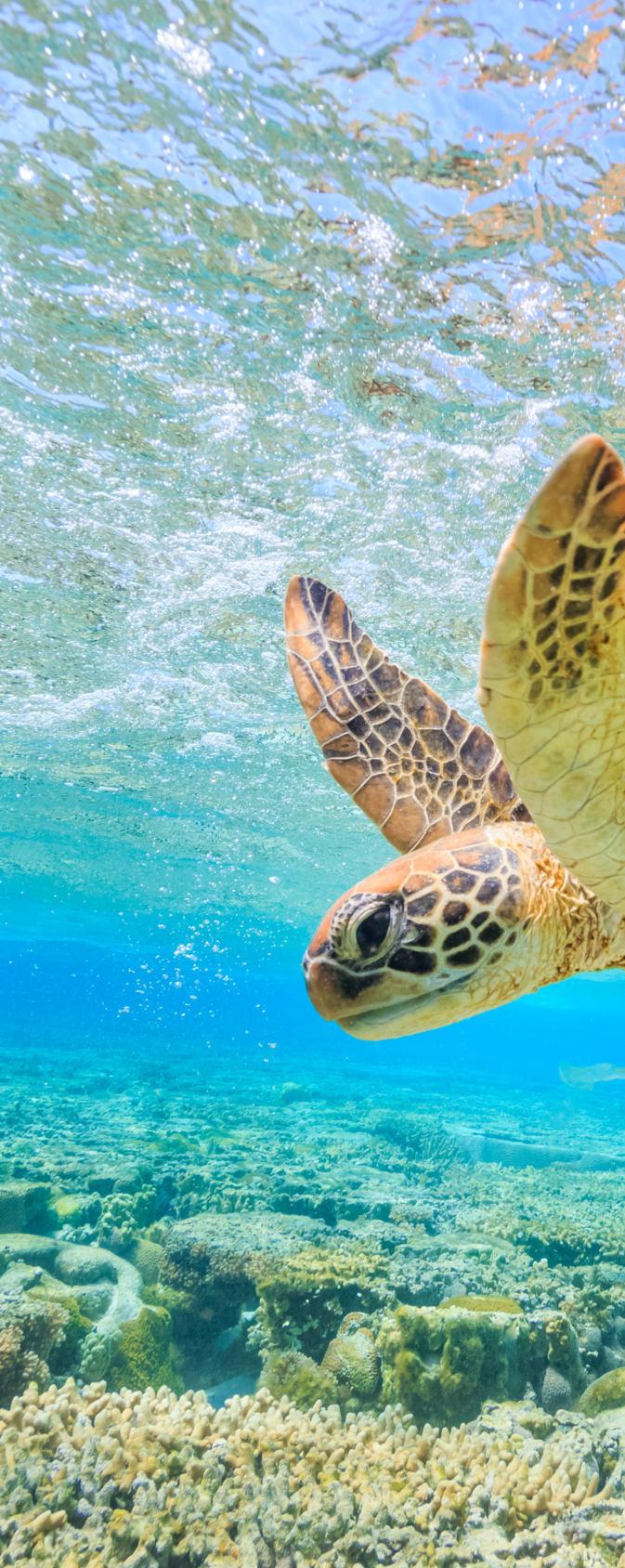
This PhD, post-doctoral research and capacity building programme aims to advance an alternative, inclusive model for the sustainable governance of ocean spaces and maritime activities taking into account the need to ensure effective gender equality and the empowerment of women at all levels. The programme is endorsed as a Decade Action to the UN Decade of Ocean Science for Sustainable Development (2021–2030). In 2022, the Empowering Women Programme team played a major advocacy and engagement role at the United Nations Ocean Conference in Lisbon and the research team published three peer reviewed academic papers. The programme is funded by Fisheries and Oceans Canada (DFO).
EuropeanUnionH2020BugWright2Project
The GOI is part of the consortium, funded by European Horizon 2020 Project “Autonomous Robotic Inspection and Maintenance on Ship Hulls,” with GOI research examining governance and regulatory barriers for service robotics in an ocean industry context. In 2022, the team published six peer-reviewed
publications, developed a stakeholder platform of regulatory and standard bodies, and endusers; and participated in seven international training sessions and conferences.
ClosingtheCircleProgramme: MarineDebris,SargassumandMarine SpatialPlanning
This PhD research programme focuses on exploring challenges and advancing potential solutions with respect to marine debris, Sargassum threats and marine spatial planning (MSP) in Small Island Developing States, with a particular focus on the Eastern Caribbean region. In 2022, the research team participated in numerous events including the largest international plastic conference – the 7 International Marine Debris Conference (IMDC), the 5 International Conference on Marine/Maritime Spatial Planning in Barcelona. In addition, the team was actively involved in the negotiations of the International Treaty on Plastics in the Marine Environment and published 10 peerreviewed journal articles. The programme is funded by The Nippon Foundation.
The GOI has also continued to contribute to the Ocean Sustainability, Governance & Management (OSGM) specialization in the Malmö MSc programme by providing expert lecturers on a wide range of topics, including Ocean Governance and Multilateral Diplomacy, scientific findings of the GOI BUGWRIGHT2 and Closing the Circle programmes, as well as supervising dissertations and participating in field studies.
EXECUTIVE AND PROFESSIONAL EDUCATION (EPEX)

From 5 to 16 September, WMU held the inaugural Education for Professional Excellence (EPEx) programme focused on Maritime Administration. Offered as two, one-week modules, the programme provided an academic offering to professionals in the maritime and ocean sectors and was specifically designed to equip individuals with specialized knowledge and insight for optimal success in Maritime Affairs.
Safe, secure, environmentally friendly, and efficient transport of the world’s goods requires a robust international legal and regulatory framework. Without a common, universal framework, the world’s ships would have to navigate through a maze of differing and potentially conflicting national laws and requirements. The International Maritime Organization (IMO) is the UN specialized agency with responsibility for the development, adoption, and updating of treaties, conventions, standards, and other legislation that comprise this framework. Other UN organizations, such as the International Labour Organization (ILO), also contribute to this framework.
In total, 17 participants from 10 countries participated in the programme that featured high level speakers from the International Maritime Organization (IMO), Swedish Transport Agency, Danish Maritime
Authority (DMA), Transport Canada, United Nations Conference on Trade and Development (UNCTAD), and European Maritime Safety Agency (EMSA), International Organization of Airport & Seaport Police (INTERPORTPOLICE), as well as the former CEO of the Ghana Shippers Authority. The first module focused on Essentials of Maritime Administration, and the second on Maritime Administrations and International Organizations.
With its unique concentration of international maritime and ocean expertise and unparalleled network of alumni and visiting faculty, WMU is proud to offer the EPEx programme to equip key and senior maritime administration personnel with skills and knowledge at both basic and advanced levels. The EPEx portfolio offers short courses for government officials and industry professionals who wish to gain a deeper understanding of maritime and ocean topics through modules that employ a combination of classroom lectures, presentations, group work/interaction, expert panels, and simulation exercises. Through its educational offerings, WMU meets the needs and requirements of particular organizations and actively supports the commitment to UN Sustainable Development Goal 4: inclusive and equitable quality education and the promotion of lifelong learning opportunities for all.
16 2022AnnualReport / WorldMaritimeUniversity
SUMMER INSTITUTE
On 22 August, WMU launched the inaugural WMU Summer Institute with a week-long intensive programme on Maritime Decarbonization. A total of 35 maritime professionals from 20 different countries and five continents spent the week learning about and discussing the opportunities and challenges surrounding the reduction of GHG emissions from shipping.
The philosophy behind the WMU Summer Institute on Maritime Decarbonization is that the inevitable maritime energy transition is an opportunity for the industry. Maritime transport is an essential pillar for world trade, carrying over 80% of international merchandise by volume and emitting around 3% of global anthropogenic emissions. The maritime industry inherently offers the lowest GHG emissions and energy consumption per transport mode, and has a wide range of technical possibilities for energy saving and replacement of fossil energy with sustainable options. Maritime transport also has great opportunities for adopting carbon free energy sources given the dimensions of commercial vessels, and that vast renewable energy resources are available on the world’s oceans.
Delivered by a team of WMU faculty and researchers, the Summer Institute incorporated a holistic approach to maritime decarbonization by looking at regulatory, social, environmental, technological
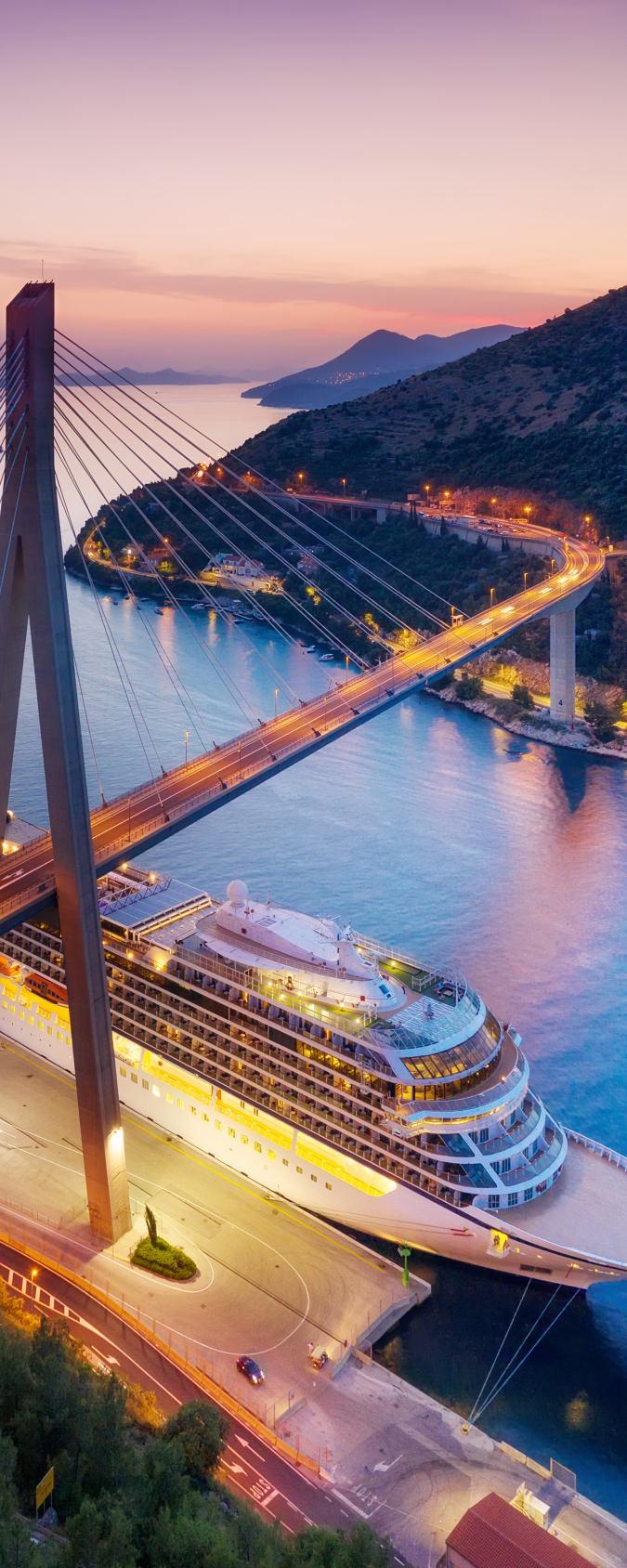
and economic challenges. In the unique international setting provided by WMU, through a combination of lectures and participant interaction, the course highlighted the complexity of the issues surrounding decarbonization of shipping while looking for solutions. Content included fundamental international regulations, technical aspects of ship design, future energy technologies including wind and solar power, and looked at the economic mechanisms that determine to a large extent the plausible pathways for decarbonization in the context of supply chain and financing.
The Summer Institute on Maritime Decarbonization supports WMU’s commitment to the United Nations 2030 Sustainable Development Agenda, in particular Goal 7 focused on affordable and clean energy and Goal 13 focused on climate action. In addition to Maritime Decarbonization, in 2023, Summer Institute offerings will include Mental Health & Well-being, International Maritime Law, and Current Issues in Ports & Terminals.
INTERNATIONAL CONFERENCES & EVENTS
WMU typically hosts and/or partners on several events annually. The COVID-19 pandemic continued to affect the onsite delivery of events in 2022, yet the University was able to deliver and contribute to several events, eventually onsite as well as online, as restrictions were lifted. Events in 2022 included:
The Regional Conference in Dominica on “Identifying Regional Challenges and Opportunities to Address the Issue of Marine Debris, Sargassum and Marine Spatial Planning” took place from 4–7 April 2022.
The One Ocean One Planet: Ocean Literacy Action 2022 Conference took place from 9–10 May, co-organized by the GOI team and hosted with the City of Malmö, and included the delivery of a parallel session on “Achieving Ocean Literacy: Building Capacity and Actions for Implementation”.
On 10 May, WMU hosted the Local Governments for Sustainability (ICLEI) Research Symposium that was part of the ICLEI World Congress 2022.
At the UN Ocean Conference in June, WMU delivered three well attended joint side events on the following themes: ‘Empowering Women: An Ocean of Opportunities in Science, Policy and Blue Economy’; ‘Empowering Women for the United Nations Decade of Ocean Science for Sustainable Development’; and ‘Educating Ocean and Maritime Leaders: A Legacy of Excellence and Future Plans at the World Maritime University’.
From 30–31 August, WMU hosted an international seminar on the role of green technologies and capacity building in maritime decarbonization, including ways of promoting global collaboration and capacitybuilding in maritime decarbonization.
On 15 September, WMU was a hub for the A Sustainable Tomorrow 2022 Conference –Sweden’s largest digital conference focused on the environment & the future.
On 28–29 September, the WMU-GOI hosted the annual Seminar for Port Security Officers (PSO), co-organized with Nordic Crisis Management and delivered to Harbour Masters from the Scandinavian Region.
From 10–13 October, WMU hosted the IMO-WMU Joint International Academic Conference: Protecting the Ocean – Moving forward at 50: London Convention & Stockholm Declaration celebrating the 50th anniversary of the two frameworks.
On 10 November, WMU hosted the hybrid workshop “Are EU ports ready for alternative fuels?” co-organized by the ENGIMMONIA and SEANERGY projects, both co-funded by the EU.
Webinars
In 2022, WMU hosted eleven webinars, eight of which were organized through the WMUSasakawa Global Ocean Institute (GOI).
• Cyber-Security Challenges and Future Perspectives
• Sustainable Shipyards
• Towards a Safety Learning Culture for the Shipping industry
• No Space for Rubbish: Research Approaches to Reduce Pressures of Marine Litter in the Eastern Caribbean
• Optimizing Vessel Operations and Environmental Compliance Through Emerging Technologies
• Overcoming Regulatory Barriers For Service Robotics in an Ocean Industry Context
• Lessons Learnt from the BBNJ Negotiations Towards a Potential New International Plastic Treaty: A Perspective of Equity
• SeaSketch: Supporting Collaborative Planning for our Oceans
• Is There a Future for the Unification of Maritime Law?
• Leveraging Drone Technology for Coastal and Marine Management
• International Law and the Nord Stream Leaks: An Academic Roundtable
The majority of the complimentary webinars were open to the public and included participants from all continents.
18 2022AnnualReport / WorldMaritimeUniversity
INTERNATIONAL COLLABORATION
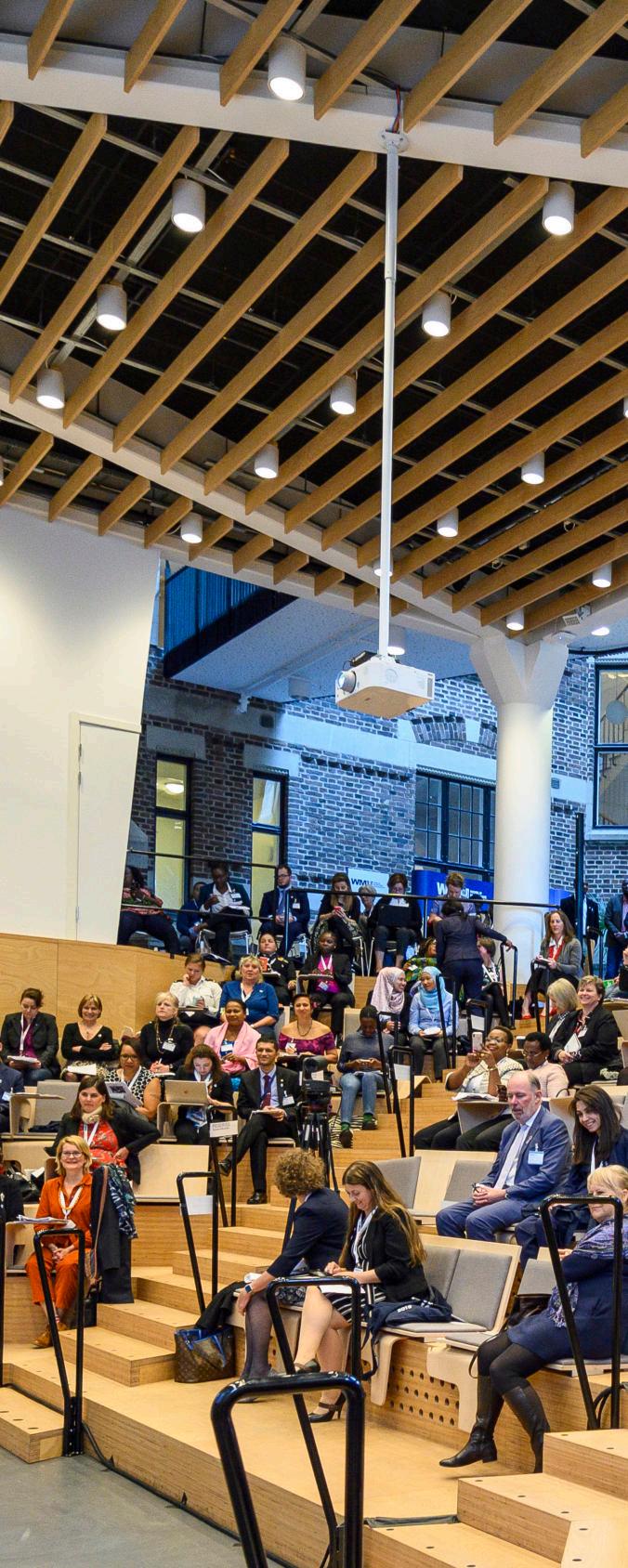
Through its membership with the Baltic University Programme and the International Association of Maritime Universities, WMU continued to strengthen its cooperation with maritime universities worldwide. Inter-agency seminars and workshops contributed to an intensified collaboration with UN maritime and oceans stakeholders. Internally, procedures were streamlined
to achieve a more strategic approach to partnership development in support of the University’s mission and ensuring its longterm financial sustainability. In 2022, nine Memoranda of Understanding/Agreements with partners from government, private sector, academia, international organizations and foundations were successfully negotiated, signed and implemented.
PUBLICATIONS
Members of the Faculty continued to publish widely in 2022, including chapters in books, contributions to learned journals including many with A/A* ratings, and conference proceedings further enhancing the University’s academic status and reputation. A list of 2022 publications can be found beginning on page 30.
The year 2022 marked the twentieth year of the WMU Journal of Maritime Affairs (JoMA) which has been published by Springer Verlag since 2012. Since 2014, JoMA also contains a section dedicated to the activities of the International Association of Maritime Universities (IAMU). JoMA has been extremely successful and its expanded global impact is noticeable. In 2022, JoMA issues were published in March, June, September and December. The June issue was entitled Unlocking Long-term Safety, Environmental and Economic Values of MASS Production. It included nine articles ranging from autonomous maritime operations and related safety challenges to human-centred risk assessment and factors affecting salvage rewards of crewless vessels.
The Maritime Commons, the digital repository of WMU, is another successful, internationally recognized outlet for WMU publications. WMU dissertations, research reports and conference presentations are hosted on the digital publications platform that was launched in August of 2015. Nearly 4,000 works had been uploaded by the close of 2022, with more than 2.5 million downloads by researchers in 234 countries and territories.
HUMAN RESOURCES IN 2022, THE INTERNATIONAL FACULTY CONSISTED OF 35 FULL-TIME FACULTY FROM 21 COUNTRIES AND 60 VISITING LECTURERS.
The WMU Faculty and Administration were strengthened in 2022 with a new Professor, an Assistant Professor, a Research Associate and two administrative staff including a Procurement and Contracts Officer and a FrontDesk Assistant.
In 2022, 60 Visiting Lecturers taught in the Malmö MSc programme. Many of the Visiting Lecturers are from international organizations including the International Maritime Organization (IMO), the United Nations Conference on Trade and Development (UNCTAD), the European Commission (EC), the European Maritime Safety Agency (EMSA), International Tanker Owners Pollution Federation Limited (ITOPF) and Cedre.
STAFF GROUP BY GENDER AS OF 31 DECEMBER 2022
20 2022AnnualReport / WorldMaritimeUniversity
Professional GeneralService Research 27% FEMALE 90% FEMALE 100% FEMALE 12 34 2 18 7

CONTRIBUTIONS TO THE UN 2030 SUSTAINABLE DEVELOPMENT AGENDA

The United Nations (UN) 2030 Agenda for Sustainable Development, adopted by the UN General Assembly in 2015, includes a bold set of Sustainable Development Goals (UN SDGs). The 17 Goals and their targets are intended, inter alia, to guide the global efforts to end poverty, promote prosperity and well-being for all, protect the environment and address climate change.
Through its well-established education, capacity building and research agenda and recognizing that all the Goals are interrelated and indivisible, in 2022 WMU continued its direct and tangible contribution to the implementation of Global Goals 4, 5, 7, 8, 9, 13, 14, 16 and 17.
WMU’s proactive approach to Goal 5 of the UN SDGs regarding gender equality and the empowerment of women continued in 2022. Until the late 1990s, female students made up less than 5% of the Malmö intake. A recruitment strategy with strong support from fellowship donors has resulted in the proportion of female students rising to around a third of the annual intake. In 2022, the Malmö MSc intake was 38 percent women.
22 2022AnnualReport / WorldMaritimeUniversity 0
PhD
ShanghaiITL
PhD DalianMSEM LLM
Malmö Malmö LLM PGDs PGDs
ShanghaiITL DalianMSEM 2022 ENROLMENT
BY GENDER
MPhil MPhil 5 48 78 2 1 13 39 1616 1 11 56 25 62 45 87 1 3 19 22 8 14 7 1 13 54
2022 GRADUATES BY GENDER
INDUSTRY LIAISON GROUP
The shipping industry requires a cadre of well-educated, trained and skilled professionals to support the moving of 80 percent of world trade. Mutually beneficial relationships between WMU as the preeminent maritime academic institution and the maritime industry are therefore indispensable.
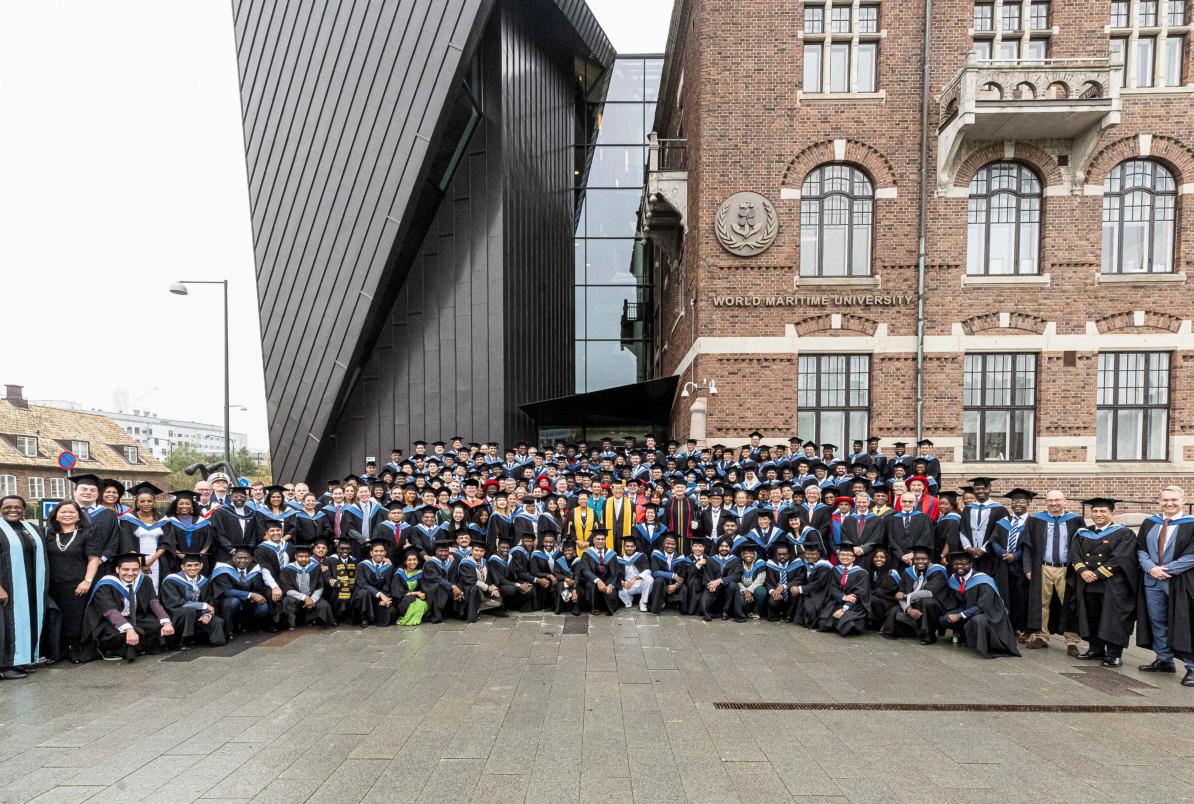
To facilitate the WMU-industry partnership, it was decided that the President, supported by an Advisory Group, should establish an Industry Liaison Group (ILG) involving key industry stakeholders reflecting a wide variety of maritime and oceans industry,
value chain actors and expertise. The ILG is to create and strengthen mutually beneficial strategic relationships and partnerships between the University and maritime industry stakeholders, including in the area of research. It is also to serve as an expert information source on key trends and developments in the industry and to further support WMU’s mission and its contribution to the UN Sustainable Development Goals. Meetings of the ILG Development Group took place in 2022 and discussions are continuing with that group, the Development Committee, and a number of industry leaders, to move the ILG initiative forward.
STEWARDS OF THE SEA CAMPAIGN
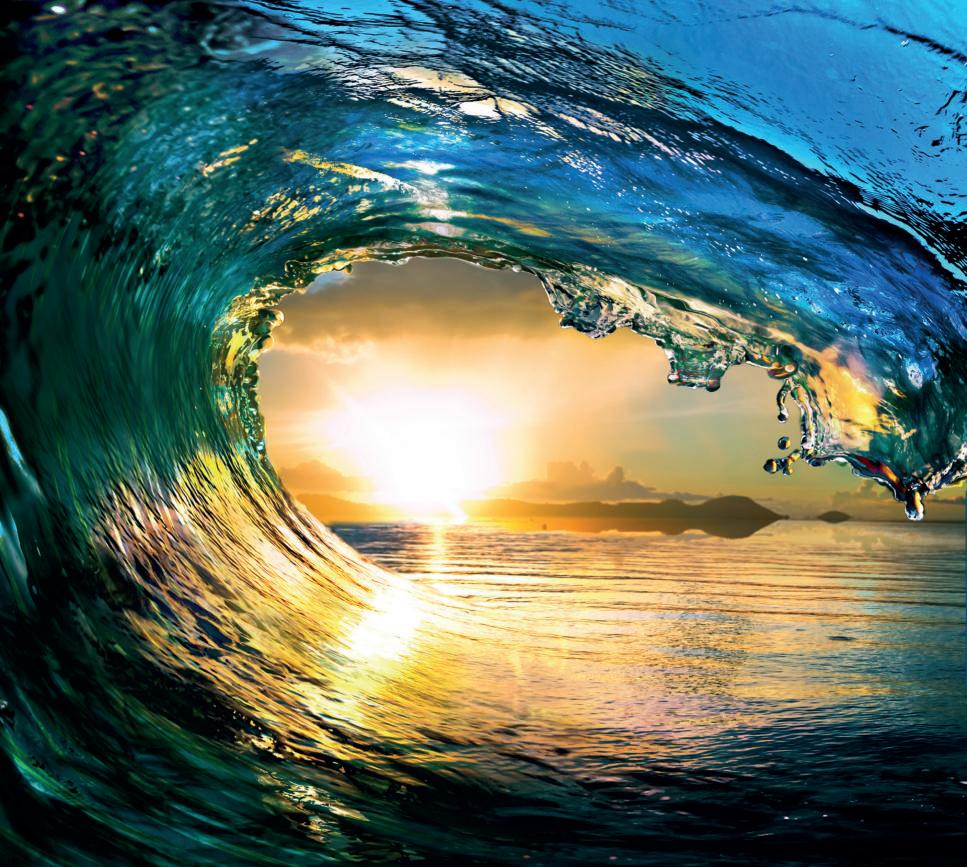
In support of the WMU Endowment Fund efforts, the Stewards of the Sea campaign aims to achieve the strategic objective of long-term financial stability, independence and sustainability of the University as well as to augment WMU’s capacity to provide education, training, research, scholarship and capacity building in maritime and ocean related matters for government officials and industry stakeholders, particularly those in developing countries.
Supported by the Endowment Fund Committees, the University devised an Institutional Advancement and
Communications Plan as the basis for strategic and systematic engagement with potential donors across a range of funding opportunities, including giving to the WMU Endowment Fund. In addition, the WMU Business Case brochure titled “Stewards of the Sea” was developed as one of the communication tools in support of fundraising efforts. The implementation of the Stewards of the Sea campaign was developed in 2018 and will be pursued in 2023 and beyond.
24 2022AnnualReport / WorldMaritimeUniversity
FELLOWSHIP DONORS
A limited number of full fellowships are available to Malmö MSc students annu competitive basis. Including the 30 Sasakawa Fellowship Students who join in 2022, The Nippon Foundation of Japan continued to be the largest fellowship do the University with an overall total of 759 sponsored students. The Inter Organization provided 19 fellowships in 2022 making it the second largest fel followed by the Government of the Republic of Korea and the Australian Maritime S Authority, each providing 7 fellowships. The Orient’s Fond provided six f Government of Germany, ITF Seafarers’ Trust, and Transport Education Train each provided five fellowships. The TK Foundation provided four fellowshi Grimaldi Foundation and Government of Malaysia each provided two fellow fellowships were provided by the Government of the Netherlands, Governmen Kingdom, Gard AS, the International Chamber of Shipping, MPA Academy Singap Norwegian Seafarers’ Union, Stena Rederi AB, and Wallenius Marine AB. Many me States provided support in 2022 as well by sponsoring their own students, in particu China, Ghana, India, Nigeria, the Philippines, Republic of Korea and South A many governments, organizations and companies provide funding for their o Approximately 5% of the MSc students in Malmö are self-funded in the Class of 2023

The following donors provided fellowships for the Class of 2023
The Nippon Foundation of Japan (30)
International Maritime Organization (19)
Government of the Republic of Korea (7)
Australian Maritime Safety Authority (7)
The Orient's Fond (6)
Government of Germany (5)
ITF Seafarers’ Trust (5)
Transport Education Training Authority (5)
The TK Foundation (4)
Grimaldi Foundation (2)
Government of Malaysia (2)
Government of the Netherlands (1)
Government of the United Kingdom (1)
Gard AS (1)
International Chamber of Shipping (1)
MPA Academy Singapore (1)
Norwegian Seafarers' Union (1)
Stena Rederi AB (1)
Wallenius Marine AB (1)
DONATIONS IN 2022
Contributions
Government of Sweden
Malmö City
International Maritime Organization
The Nippon Foundation
Government of Antigua
Government of Canada
Government of the Republic of Korea
Government of Thailand
ITF Seafarers' Trust
Fellowships and Fees
InternationalMaritimeOrganization
IMO Global Capacity-building and Training Technical Cooperation Programme
– Government of The Netherlands
Governments
Australian Maritime and Safety Authority
Busan Port Authority
Chilean Navy
Ghana Ports and Harbours Authority
Government of Malaysia
Government of Norway
Government of the Netherlands
Government of the United Kingdom
Kingdom of Bahrain
Kingdom of Saudi Arabia
Maritime Academy of Asia and the Pacific
Maritime and Port Authority of Singapore
Ministry of Transport, China
Ministry of Transport, Germany
Nigerian Maritime Safety Authority
Peruvian Government
Philippine Coast Guard
Republic of Korea
Transport Education Training Authority, South Africa
Industry GARD
Grimaldi Foundation
International Chamber of Shipping
Korea Institute of Maritime and Fisheries Technology (KIMFT)
Korea Marine Surveyor & Sworn Measurers' Corporation (KOMSA)
Korean Register of Shipping – Republic of Korea
Norwegian Cruise Lines
Shipping Corporation of India
Stena Rederi AB
TK Foundation, UK
Wallenius Marine AB
Zuetina
Non-GovernmentalOrganizations
FUZE
ITF Seafarers’ Trust
The Nippon Foundation
Maritime Academy of Asia & the Pacific
Norwegian Seafarers’ Union
Orient's Fond
TK Foundation
World Nuclear Transport Institute
Indian Maritime Trust
Indonesia Endowment Fund for Education
Norwegian Seafarers' Union
26 2022AnnualReport / WorldMaritimeUniversity
FIELD STUDIES
Students in the Malmö MSc benefit from a unique programme of field studies at host organizations such as shipping companies, port authorities, maritime administrations and other governmental and non-governmental organizations around the world. Cooperation with a range of global institutions offers students a unique opportunity to experience the application of the latest theories and technologies in reallife maritime situations, and to forge bonds
FACILITIES
With the growing faculty, staff and research, the University continued to make excellent use of the Neptune premises that were inaugurated in the last quarter of 2021 and generously provided by the host City of Malmö. Located a short walk from the main WMU building, the new premises provide an additional 46 rooms of office and meeting space. The new Neptune facilities house administrative staff including the Finance and IT teams, as well as researchers, PhD students and visiting faculty.
with a network of maritime professionals worldwide. Field studies are a highlight of the WMU experience and vary each year by specialization. Although the field study programme continued to be impacted in 2022 by the COVID-19 pandemic, field studies took place in Denmark, Finland, Germany, Greece, Italy, the Netherlands, Norway, Lithuania, Singapore, the United Kingdom and several locations in Sweden.
With the exceptional growth and expansion of the University, WMU now occupies the main building that was inaugurated in 2015, offices in an adjacent building that house the WMU-Sasakawa Global Ocean Institute and were inaugurated along with the Institute in 2018, and now the additional space at Neptune inaugurated in 2021.

FINANCES
The Government of Sweden and the City of Malmö continue to provide considerable support to the University. All donors that provide contributions to the operational budget, student fellowships, Visiting Lecturers and field study opportunities are greatly appreciated including in-kind contributions that support the financing and core activities of the University.
FinancialOutcome(GeneralFund)fortheyears2020to2022(inthousandUSD)
The 2022 Financial outcome reported total revenue of USD 16.6 million and a total expenditure of USD 14.7 million and a Gain on Currency Exchange of USD 2.2 million. The total amount transferred to the reserves was USD 4.1 million.
Revenue 2020 2021 2022 Donor Contributions 6,816 6,3406,359 Fellowship and Fees 7,607 6,432 7,001 Commercial and Reserve Generating Activities 2,078 2,588 2,709 Other Revenue 298 382 539 TotalRevenue 16,799 15,742 16,608 Expenditure Staff and other Personnel Costs 10,081 9,271 9,575 Travel 291 166 570 Supplies, Consumables and Other Running Costs 957 909 976 Cost of Sales of Inventory 77 13 Outsourced Services 599 513 501 Student Direct and Training Costs 2,627 2,447 2,753 Depreciation 224 197 203 Other Expenses 366 167 141 TotalExpenses 15,152 13,677 14,732 OperationalSurplus 1,648 2,065 1,876 28 2022AnnualReport / WorldMaritimeUniversity
The University is steadily building up its Reserve Fund, attributed to the surplus it generated in recent years, which is transferred to form part of the Reserve and Fund Balances.
The Reserve and Fund Balances of USD 15.7 million will contribute to the long term financial sustainability of the University.
(inthousandUSD) 2020 2021 2022 General Fund Reserve as at 1 January 8,709 7,897 11,555 Surplus -812 3,658 704 General Fund Reserve as at 31 December 7,897 11,555 12,259 Working Capital Fund 1,042 939 1,529 Special Reserve Fund 2,075 1,8701,870 TotalReservesandFundBalancesasat31December 11,014 14,364 15,658 USD17.5 million DonorsandOtherRevenueSources 2022 The Nippon Foundation, Japan 27% Government of Sweden 16% Outreach Programme 7% IMO Global Capacity-building and Training Technical Cooperation Programme 5% Government of the Republic of Korea 4% Government of Nigeria 3% Self-Financed 2% Government of Norway 2% Government of South Africa 2% Government of Australia 2% International Transport Workers’ Federation 2% Government of Canada 1% Government of Germany 1% PhD and Other Fees 1% Other Revenue 18% Malmö City (in-kind contribution) 5% United States of America (in-kind contribution) 2%
ReserveandFundBalances(GeneralFund)asat31December2020to2022
29
PUBLICATIONS
ACADEMIC JOURNALS
Shao Y, Carballo Piñeiro L, MejiaM.Q.Jr (2022). Recognition of foreign judicial sales of ships and private international law. Journal of International Maritime Law, 28(3): 166–185.
Ávila Zúñiga Nordfjeld A, Dalaklis D, MejiaM.Q.Jr, Neri K (2022). Applying the legal provisions of the ISPS Code to streamline cooperation between government authorities involved in maritime security duties. Il Diritto Marittimo – Quaderni, 8: 59–78.
D.Dalaklis,A.Christodoulou,A.I.Ölçer,F.Ballini, A. Dalaklis and K.Lagdami, (2022), The port of Gothenburg under the influence of the fourth stage of the industrial revolution: Implementing a wide portfolio of digital tools to optimize the conduct of operations, Maritime Technology and Research, 4(3), 25384. DOI: 10.33175/mtr.2022.253844.
Anh Tuan Hoang, Aoife M. Foley, Sandro Nižetić, Zuohua Huang, Hwai Chyuan Ong, AykutI.Ölçer, Van Viet Pham, Xuan Phuong Nguyen, Energy-related approach for reduction of CO2 emissions: A critical strategy on the port-to-ship pathway, Journal of Cleaner Production, Volume 355, 2022, 131772, ISSN 0959-6526, https://doi. org/10.1016/j.jclepro.2022.131772
Swarup Kumar Nayak, Sandro Nižetić, Van Viet Pham, Zuohua Huang, AykutI.Ölçer, Van Ga Bui, Kanit Wattanavichien, Anh Tuan Hoang, Influence of injection timing on performance and combustion characteristics of compression ignition engine working on quaternary blends of diesel fuel, mixed biodiesel, and t-butyl peroxide, Journal of Cleaner Production, Volume 333, 2022, 130160, ISSN 0959-6526, https://doi.org/10.1016/j. jclepro.2021.130160
A.Christodoulou,D.Dalaklis,P.RaneriandR. Sheehan, (2022), An overview of the legal search and rescue framework and related infrastructure along the Arctic Northeast Passage, Marine Policy, 138, 104985. DOI: 10.1016/j.marpol.2022.104985 [In relation to the MAREC/SAMRISK project].
Ballini,F.,Vakili,S.,Schönborn,A.,Ölçer,A., Canepa,M., & Sciutto, D. (2022). Optimal decision making for emissions reduction measures for Italian container terminals. Proceedings of the Institution of Mechanical Engineers, Part M: Journal of Engineering for the Maritime EnvironmentVolume 236, Issue 1, February 2022, Pages 283–300, https://doi. org/10.1177/14750902211027680
Y. Ichimura, D.Dalaklis,M.KitadaandA. Christodoulou, (2022), Shipping in the era of digitalization: Mapping the future strategic plans of major maritime commercial actors, Digital Business, 2(1), 100022. DOI: 10.1016/j.digbus.2022.100022.
S.V.Vakili,F.Ballini,D.DalaklisandA.I.Ölçer, (2022), A Conceptual Transdisciplinary Framework to Overcome Energy Efficiency Barriers in Ship Operation Cycles to Meet IMO’s Initial Green House Gas Strategy Goals: Case Study for an Iranian Shipping Company, Energies, 15(6), 2098. DOI: 10.3390/en15062098.
Vakili,S.,Schönborn,A.&Ölçer,A.I. Application of the transdisciplinary shipyard energy management framework by employing a fuzzy multiple attribute group decision making technique toward a sustainable shipyard: case study for a Bangladeshi shipyard. Journal of Shipping and Trade 7, 22 (2022). https://doi. org/10.1186/s41072-022-00123-8
Vakili,S.,Ölçer,A.I.,Schönborn,A.,Ballini,F. & Anh Tuan Hoang. (2022). Energy-related clean and green framework for shipbuilding community towards zeroemissions: A strategic analysis from concept to case study. International Journal Energy Research, Wiley. DOI: 10.1002/er.7649.
SeyedvahidVakili,AlessandroSchönborn,Aykut I.Ölçer, Techno-economic feasibility of photovoltaic, wind and hybrid electrification systems for stand-alone and grid-connected shipyard electrification in Italy, Journal of Cleaner Production, Volume 366, 2022, 132945, ISSN 0959-6526, https://doi.org/10.1016/j. jclepro.2022.132945
D. D.-Y. Kouakou, D.DalaklisandR.Baumler, (2022), Analysing Risks in Naval Operations: The Case of Visit, Board, Search and Seizure Operations in the Côte D’Ivoire Navy, Maritime Technology and Research, 5(1), 258421. DOI: 10.33175/mtr.2023.258421.
P.GhaforianMasodzadeh,A.I.Ölçer,D.Dalaklis, F.BalliniandA.Christodoulou, (2022), Lessons Learned during the COVID-19 Pandemic and the Need to Promote Ship Energy Efficiency, Journal of Marine Science and Engineering, 10, 1343. DOI: 10.3390/ jmse10101343.
A.AndreadakisandD.Dalaklis, (2022), Evacuation of ships: Discovering the mishaps behind the casualties, Journal of International Maritime Safety, Environmental Affairs, and Shipping, 6:2–3, pp. 135–140. DOI: 10.1080/25725084.2022.2129200.
M.Carrera-Arce,I.Bartusevičienė, and P. Divari, (2022). Healthy Workplace Onboard: Insights Gained from the COVID-19 Impact on Mental Health and Wellbeing of Seafarers. Work 73(1): 29–40. DOI:10.3233/WOR-2107911.
Tang, L., Abila, S., Kitada,M., Malecosio Jr., S., Montes, K. K. (2022). Seafarers’ mental health during the COVID-19 pandemic: an examination of current supportive measures and their perceived effectiveness. Marine Policy, 145, https://doi.org/10.1016/j. marpol.2022.105276
30 2022AnnualReport / WorldMaritimeUniversity
Ojwala,R.A.,Kitada,M.,Neat,F., Buckingham, S. (2022). Effectiveness of gender policies in achieving gender equality in ocean science programmes in public universities in Kenya. Marine Policy, 144, https://doi. org/10.1016/j.marpol.2022.105237
Pauksztat, B., Salin, D., & Kitada,M. (2022). Bullying Behavior and Employee Well-Being: How Do Different Forms of Social Support Buffer Against Depression, Anxiety and Exhaustion? International Archives of Occupational and Environmental Health, https://doi. org/10.1007/s00420-022-01844-w
Pauksztat, B., Grech, M. R., & Kitada,M. (2022). The impact of the COVID-19 pandemic on seafarers’ mental health and chronic fatigue: Beneficial effects of onboard peer support, external support and Internet access. Marine Policy, https://doi.org/10.1016/j. marpol.2021.104942
Baum-Talmor, P., & Kitada,M. (2022). Industry 4.0 in shipping: Implications to seafarers’ skills and training. Transportation Research Interdisciplinary Perspectives, 13, https://doi.org/10.1016/j.trip.2022.100542
Yildiz,S., Tonoğlu, F., Uğurlu, Ö., Loughney, S., & Wang, J. (2022). Spatial and statistical analysis of operational conditions contributing to marine accidents in the Singapore Strait. Journal of Marine Science and Engineering, 10(12), 2001, https://doi.org/10.3390/ jmse10122001
Yildiz,S., Uğurlu, Ö., Loughney, S., Wang, J., & Tonoğlu, F. (2022). Spatial and statistical analysis of operational conditions influencing accident formation in narrow waterways: A Case Study of Istanbul Strait and Dover Strait. Ocean Engineering, 265, 112647, https://doi. org/10.1016/j.oceaneng.2022.112647
Tonoğlu, F., Atalar, F., Başkan, İ. B., Yildiz,S., Uğurlu, Ö., & Wang, J. (2022). A new hybrid approach for determining sector-specific risk factors in Turkish Straits: Fuzzy AHP-PRAT technique. Ocean Engineering, 253, 111280, https://doi.org/10.1016/j.oceaneng.2022.111280
Sivri, N., Yildiz,S., Sönmez, V. Z. & Uğurlu, Ö. (2022). Olası Bir Gemi Kazası Ardından Oluşacak Petrol Kirliliğinin Sektör Kadıköy Kıyısal Alanındaki Toksik Etkisinin Belirlenmesi . Journal of Anatolian Environmental and Animal Sciences, 7 (1) , 53–61 . DOI: 10.35229/ jaes.1009043.
Bishop, B., E.C.J. Oliver & C.Aporta. (2022) Coproducing maps as boundary objects: Bridging Labrador Inuit knowledge and oceanographic research. Journal of Cultural Geography https://doi.org/10.1080/08873631.20
21.1998992
Hebbar,A. A., & Dharmasiri, I. G. (2022). Management of marine oil spills: A case study of the Wakashio oil spill in Mauritius using a lens-actor-focus conceptual framework. Ocean & Coastal Management, 221, https://doi.org/10.1016/j.ocecoaman.2022.106103
Hussein, K. and Song,D-W. (2022), Sustainably Integrated Port Supply Chains: Concepts and Propositions, International Journal of Logistics Research and Applications, https://doi.org/10.1080/13675567.202 1.1981274
Sahoo,S. and Song,D-W. (2022), Recent Patterns of Competition and Co-operation among Major Container Ports in Asia: An Implication for Busan, KMI International Journal of Maritime Affairs and Fisheries, Vol. 14, No. 1, pp. 1–28.
Schönborn,A. (2022). Combination of propulsive thrust and rotational power for ships from a cyclic pitch Darrieus rotor sail. Sustainable Energy Technologies and Assessments, Volume 52, Part A, August 2022, 102008.
Li, X., Du, Y., Chen, Y., Nguyen, S., Zhang, W., Schönborn,A., Sun, Z. (2022). Data fusion and machine learning for ship fuel efficiency modeling: Part I – voyage report data and meteorological data. Communications in Transportation Research, 2 doi:10.1016/j.commtr.2022.100074.
Du, Y., Chen, Y., Li, X., Schönborn,A., & Sun, Z. (2022). Data fusion and machine learning for ship fuel efficiency modeling: Part II – voyage report data, AIS data and meteorological data. Communications in Transportation Research, 2 doi:10.1016/j.commtr.2022.100073.
Du, Y., Chen, Y., Li, X., Schönborn,A., & Sun, Z. (2022). Data fusion and machine learning for ship fuel efficiency modeling: Part III – sensor data and meteorological data. Communications in Transportation Research, 2 doi:10.1016/j.commtr.2022.100072.
SchönbornA., Lee, K.-K. (2022) Ignition improvers for aqueous ammonia as marine fuel, Proceedings of the Institution of Mechanical Engineers, Part M: Journal of Engineering for the Maritime Environment, 2022. doi:10.1177/14750902221140689.
Govindan, K., Zhuang Y., ChenG. (2022) Analysis of factors influencing residents' waste sorting behavior: A Case Study of Shanghai, Journal of Cleaner Production, 349, 131126.
Wang, X., Chen,G., & Xu, S. (2022). Bi-objective green supply chain network design under disruption risk through an extended NSGA-II algorithm. Cleaner Logistics and Supply Chain, 3, 100025.
Alamoush,AnasS,Ballini,F.,Ölçer,A.I., 2022. Ports, maritime transport, and industry: The immediate impact of COVID-19 and the way forward. Maritime Technology and Research 4, 1–26. https://doi. org/10.33175/mtr.2022.250092
31
PUBLICATIONS (Continued)
PUBLICATIONS
(Continued)
Alamoush,AnasS.,Ölçer,A.I.,Ballini,F., 2022. Ports’ role in shipping decarbonisation: A common port incentive scheme for shipping greenhouse gas emissions reduction. Cleaner Logistics and Supply Chain 3, 100021. https://doi.org/10.1016/j.clscn.2021.100021
Masodzadeh,P.G.,Ölçer,A.I.,Ballini,F.,& Christodoulou,A. (2022). How to bridge the short-term measures to the Market Based Measure? Proposal of a new hybrid MBM based on a new standard in ship operation. Transport Policy, 118, 123–142.
Masodzadeh,P.G.,Ölçer,A.I.,Ballini,F.,& Christodoulou,A. (2022). A review on barriers to and solutions for shipping decarbonization: What could be the best policy approach for shipping decarbonization?. Marine Pollution Bulletin, 184, 114008.
Masodzadeh,P.G.,Ölçer,A.I.,Dalaklis,D.,Ballini, F.,&Christodoulou,A. (2022). Lessons Learned during the COVID-19 Pandemic and the Need to Promote Ship Energy Efficiency. Journal of Marine Science and Engineering, 10(10), 1343.
Kelly,R.,Elsler,L.G.,Polejack,A.,vanderLinden, S.,Tönnesson,K.,Schoedinger,S.E.,&Wisz,M. S. (2022). Empowering young people with climate and ocean science: Five strategies for adults to consider. One Earth 5(8), 861–874. DOI: https://doi.org/10.1016/j. oneear.2022.07.007
Agersnap, A. , Sigsgaard, E. E., Jensen, M. R, De Paula Avila, M;., Carl , Møller, P. R., Krøs, S. L., Knudsen, S. W,,Wisz,M.S.,Thomsen,P.F. (2022) A national scale “BioBlitz” using citizen science and eDNA metabarcoding for monitoring coastal marine fish. Frontiers Marine Science https://doi.org/10.3389/fmars.2022.824100
Elsler, L.G., Oostdijk, M., Levin, L.A., Satterthwaite, E.V., Pinsky, M., Ortuno Crespo, G. and Wisz, M.S., (2022) Protecting ocean carbon through biodiversity and climate governance. Frontiers in Marine Science https://doi. org/10.3389/fmars.2022.880424
Oostdijk, M. , Elsler, L., Ramírez-Monsalve, P., Orach, K. Wisz.M.S. (2022) Governing open ocean and fish carbon: perspectives and opportunities. Frontiers Marine Science https://doi.org/10.3389/fmars.2022.764609
Shellock, RJ., Wisz,M.S. (2022) MS Building leaders for the UN Ocean Science Decade: a guide to supporting early career women researchers within academic marine research institutions. ICES Journal of Marine Science DOI:10.1093/icesjms/fsac214.
Shellock, B, Cvitanovic, C. Wisz,M.S. (2022) Breaking down barriers: A global perspective on women’s leadership within interdisciplinary marine research institutions. One Earth – Cell Press DOI: https://doi.org/10.1016/j.oneear.2022.05.006
Nisa,Z.A., Schofield,C. & Neat,FC. (2022) Work Below Water: The role of scuba industry in realising sustainable development goals in small island developing states. Marine Policy 136. https://doi.org/10.1016/j.marpol.2021.104918
Johanessen,E,etal (2022).The Sea Change Needed for Gender Equality in Ocean-Going Research. Marine Technology Society Journal, May/June 2022, pp. 18–24(7). https://doi.org/10.4031/MTSJ.56.3.6
Hu N., Bourdeau PE., Halos C., Liu Y. & J.Hollander (2022) Meta-analysis reveals variance in tolerance to climate change across marine trophic levels. Science of the Total Environment 827: 154244. https://doi. org/10.1016/j.scitotenv.2022.154244
Hu N., Brönmark C., Bourdeau PE. & J.Hollander (2022) Marine gastropods at higher trophic levels show stronger tolerance to ocean acidification. OIKOS e08890. https://doi.org/10.1111/oik.08890
Amone-Mabuto M., J.Hollander, B. Lugendo, J.B. Adams & S. Bandeira (2022) A field experiment exploring disturbance-and-recovery, and restoration methodology of Zostera capensis to support its role as a coastal protector. Nordic Journal of Botany e03632 doi: 10.1111/njb.03632.
Kindeberg T., Olsson PA., Almström B., Skoog M. & J. Hollander (2022) Toward a multifunctional naturebased coastal defense – a review of the interaction between beach nourishment and ecological restoration. Nordic Journal of Botany e03751. doi: 10.1111/njb.03751.
Van Well L., Isayeva A., Olsson PA. & J.Hollander (2022) Public perceptions of cultural ecosystem services provided by beach nourishment and eelgrass restoration in Southern Sweden. Nordic Journal of Botany e03654. doi: 10.1111/njb.03654.
HollanderJ.,DoelleM.&PA. Olsson (2022) Introduction – Nature-based Solutions for coastal protection. Nordic Journal of Botany doi: 10.1111/ njb.03940.
WegoroJ.,PambaS.,GeorgeR.,HollanderJ.&B. Lugendo (2022) Seagrass restoration in a high-energy environment in the Western Indian Ocean. Estuarine, Coastal and Shelf Science 278: 108119. doi.org/10.1016/j.ecss.2022.108119
TheocharidisG. (2022), Some thoughts on the functionality of the Beijing Convention, JIML November–December 2022.
K.Auld and L. Feris (2022), Addressing vulnerability and exclusion in the South African small-scale fisheries sector: does the current regulatory framework measure up? Maritime Studies 21. https://doi.org/10.1007/s40152022-00288-9
32 2022AnnualReport / WorldMaritimeUniversity
PUBLICATIONS (Continued)
BOOKS
Neat,F.Baumler,R,Auld,K.&DeukhoonHan,P. (2022). CAPFISH (First edition). Capacity Building Project for Implementation of International Instruments to Combat IUU Fishing. Korea Maritime Institute, Busan. Barry Kirwan, Beatrice Bettignies-Thiebaux, Matteo Cocchioni, RaphaelBaumler,MariaCarreraArce (2022). Towards a safety learning culture for the shipping industry: a white paper. Available at: https://commons. wmu.se/lib_documents/1/
BOOK CHAPTERS
Kitada,M. (2022). Gender and work within the maritime sector. In: T. Wright, L. Budd, S. Ison (eds.) Women, Work and Transport (Transport and Sustainability, Vol. 16), Bingley: Emerald, pp. 229–248, https://doi.org/10.1108/ S2044-994120220000016015
P. Steinberg, G. Ferloni, C.Aporta, G. Bridge, A. Chircop, K. Coddington, S. Elden, S. C. Kane, T. Koivurova, J. Shadian, A. Stammler-Gossmann (2022) “Navigating the Structural Coherence of Sea Ice,” in Braverman, I. Laws of the Sea: Interdisciplinary Currents (1st ed.). Routledge. (165–182) https://doi.org/10.4324/9781003205173
Hussein, K. and Song,D-W. (2022), Maritime Logistics for the Next Decade: Challenges, Opportunities and Required Skills, in Merkert, R. and Hoberg, K. (eds.), Global Logistics and Supply Chain Strategies in the 2020s: Vital Skills for the Next Generation, Springer, pp. 151–173.
Baumler,R., Drillet, D., and Wiley C. (2022). Some Indispensable Tools to Support Risk Management as Part of the Ballast Water Management Convention. Chapter in BALLAST WATER MANAGEMENT & CHALLENGING CURRENT INVASIONS. A Collection of Commentaries & Essays on Ballast Water Management. Cambridge Scholars Publishing. https://www.cambridgescholars. com/product/978-1-5275-8510-2/
33
World Maritime University
PO Box 500
S-201 24 Malmö
Sweden
www.wmu.se
The World Maritime University was established in 1983 within the framework of the International Maritime Organization, a specialized agency of the United Nations.
34 2022AnnualReport / WorldMaritimeUniversity








































